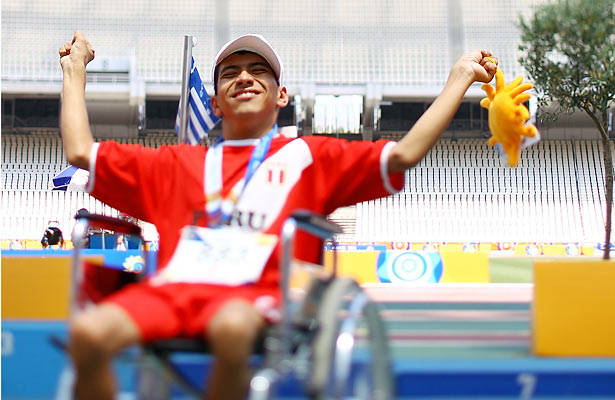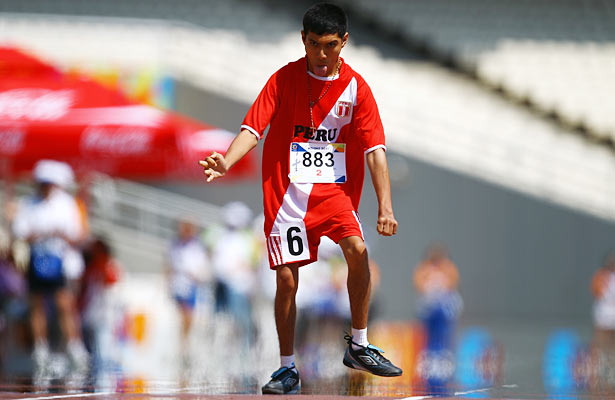Sport in its purest form
 Ederson Idrogo reacts to finishing an event at the 2011 Special Olympics World Summer Games in Athens. (Photo Credit: Vladimir Rys/Getty Images)
Ederson Idrogo reacts to finishing an event at the 2011 Special Olympics World Summer Games in Athens. (Photo Credit: Vladimir Rys/Getty Images)
I’ll be the first to admit it…I’m a very lucky man. Over the course of my life, I’ve had the good fortune to witness, first hand, some of the world’s greatest athletes performing amazing feats in sports. I’ve seen Michael Phelps swim. I’ve seen Tiger Woods drive. I’ve seen Michael Jordan fly.
And now, I have a new name to add to this impressive roster: an amazing athlete who, with a gutsy and inspiring performance, has made an indelible mark on my sports memory. That athlete is Ederson Idrogo.
“Who?” you ask. You’ve never heard of him? Well, let me explain:
I was in Athens, Greece, covering the 2011 Special Olympics World Summer Games for ESPN.com. On a particularly hot and sunny day, I found myself sitting in the pressroom at the Olympic Stadium, the site of the track and field competitions, working on a story. Feeling like I needed a break, I wandered into the stadium to get some fresh air.
As I strolled in, I glanced up at the scoreboard to see which event was about to start. It was an early heat of the men’s 100-meter walk. I took a seat near the finish line just as the start gun fired. As the crowd cheered, the racers made their way down the straightaway and each one crossed the finish line with the joy and exuberance that I was quickly learning is typical of all Special Olympics events.
As I started up the steps, heading back to the pressroom, I noticed some cheering coming from towards the start line. It was faint at first, just a handful of spectators clapping and yelling, but it quickly began to grow in volume and intensity. I turned to see what the commotion was about and that’s when I spotted him. Unnoticed at first, I saw a lone figure out on the track and it dawned on me…this race wasn’t over.
Down on the track, in Lane 7, was Ederson Idrogo.
What was striking about the scene was that Idrogo, a 23-year-old from Tumbes, Peru, was inching his way down the track, obviously using every ounce of strength he could muster (and then some) to simply put one foot in front of the other. Bathed in sweat under the pounding Athens sun, he displayed a grit and determination unlike anything I’ve ever seen. I’ve seen athletes “dig deep” before, but never as deep as this.
And with each hard-fought step he took, the crowd’s enthusiasm grew. Scores of Special Olympics volunteers who were stationed at the top of the stands poured down the aisles to get closer to the track and all the spectators were on their feet, clapping in unison, hoping that the rhythmic beat would somehow help Idrogo find just a little bit more of whatever it was that was fueling him.
Finally, Ederson Idrogo made it to the finish line and immediately collapsed into a waiting chair, completely spent. But there was one thing that betrayed his appearance of total exhaustion. It was the beaming smile that lit up his entire face. It didn’t matter that he finished nearly four minutes after all the other competitors.
What mattered was that he finished. He finished his race. He won his race. And as he left the track, he did what most athletes do when they win. He raised his arms in victory.
After the race, I sat there for a few minutes, trying to fully appreciate what I had just seen. In all my years of watching great athletes do great things, I never thought that simply walking 100 meters could rank among the greatest, but it has. I was also thinking how lucky I was to have wandered into the stadium at that exact moment. Five minutes earlier or later and I would’ve never known about Ederson Idrogo, or be inspired by him.
 (Photo Credit: Vladimir Rys/Getty Images)
(Photo Credit: Vladimir Rys/Getty Images)
But maybe I wasn’t that lucky. Maybe similar scenes of accomplishment, determination, and yes, even courage (a term that usually makes me cringe when used in a sports context) were playing out in every venue and on every field of play throughout the World Summer Games. Maybe that’s what Special Olympics is all about.
Before the Games started, Special Olympics Chairman and CEO Tim Shriver told me that I would be seeing the “greatest athletes in the world,” and now I have a better understanding of what he meant. Sure, there were no world records set at the Games, and no athlete secured a lucrative endorsement deal, but if “greatness” can be defined as overcoming daunting obstacles with determination and heart to achieve your own personal best, then there was a whole lot of greatness at the World Summer Games.
Throughout my time in Athens, I was continually being reminded of the transformative power of sports. There was Jermaine Edie , who was abandoned as a child because of his intellectual disability but found a “family” when he discovered power lifting and Special Olympics. There was Loretta Claiborne who turned her anger at not being understood into a lifelong passion for running and athletics. And there was NBA great Dikembe Mutombo who has dedicated his post-basketball life to making sure no one is denied the right to play.
In this day and age of lock-outs and bad behavior, it’s sometimes easy to become cynical and jaded about sports. But great athletes like Edie, Claiborne and Idrogo serve as reminders of what sport really is, in its purest form.







